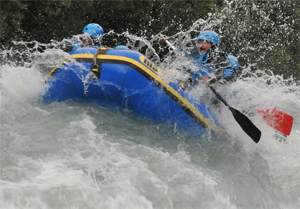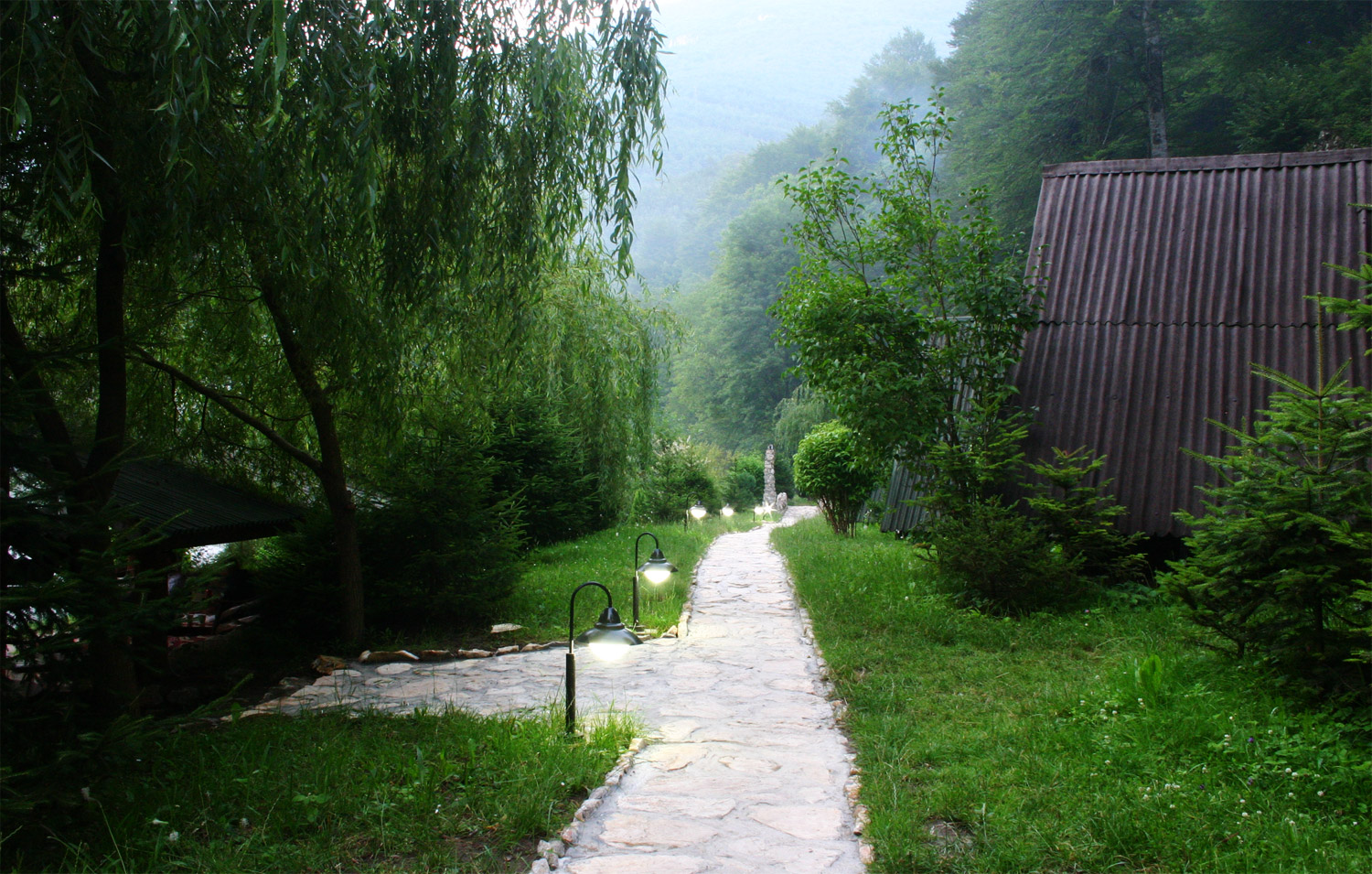
The Encijan rafting camp sits in the Tara River Canyon, which connects Bosnia and Herzegovina with Montenegro. The Canyon is considered one of the most beautiful in the Western Balkans, and the camp the most special in the Canyon.
With accommodation in chalets, traditional cuisine, a terrace above the river and the stunning environment around it, the camp has been a favourite spot for lovers of rafting and nature holidays for more than 15 years.
From hobby to serious business enterprise
Milan Šupić, from the nearby town of Foča, is the owner of the camp. Until 20 years ago, rafting was only a favourite hobby for him, but then he decided to turn it into a business. The decision changed his life but also created a new source of income for many of the citizens of his hometown. “At the beginning, the business did not do well. But then, over the next four to five years, the camp became a serious enterprise. When you do something you love, success is inevitable,” says Milan.
“At the beginning, the business did not do well. But then, over the next four to five years, the camp became a serious enterprise. When you do something you love, success is inevitable.”
Milan explains that when he decided to go into business, there was nothing there. Now, the Tara River Canyon is a popular destination for rafting lovers in the Western Balkans. Twenty-five new rafting camps have since been established around the Canyon. In each of the past two years, approximately 50,000 tourists visited the Canyon.
The region also offers adventure tourism activities, including canyoning and hiking through the natural beauty of Sutjeska and Durmitor national parks. Milan explains that visitors usually stay five days to enjoy the full package. They spend the nights with traditional food, drinks and campfire, and during the day they go rafting or enjoy one of the other kinds of adventure tourism.
However, like many enterprises starting out in the Western Balkans, Milan’s business had its challenges. He remembers that 20 years ago there was no proper road to the Canyon. The only way to reach it was to take a long walk through a dense wood, or a boat trip. “When I decided to construct the camp, I had to take all the material first to the other side of the border to Montenegro, and from there transport the material by boat to the location of the camp,” he says.
A tarmac road now makes it possible to reach the Canyon by car and minibus, but the increasing number of visitors also called for improvements in visitor safety and better information services.

“The project placed new orientation signs along the road; in addition, they placed benches and identified panorama. These were maybe small but certainly important elements for an international tourist destination such as the Tara River Canyon.”
EU support for a safer, richer tourist experience
To meet these challenges, support from the EU-funded Tourism, Adrenaline and Rafting Adventure (T.A.R.A.) project “came just at the right time” according to Milan. He explains that following the construction of the new road, the number of visitors who started to travel in their own vehicles increased. The road was not marked, and some of them got lost or delayed. Thanks to the project, the road is now properly signposted, with benches and panorama points indicated along the route.
Other infrastructure improvements are ongoing. Plans include the construction of raft platforms at arrival and descentpoints, a floating platform on Piva Lake, viewing platforms for nature watching, and rock climbing routes. The project is also contributing to the safety protocols for visitors with increased coordination of the rescue services on both sides of the border, development of joint safety procedures with joint emergency drills and rescue exercises, and purchasing rescue equipment.
The T.A.R.A project was funded as part of the BiH-MNE 2014-2020 Cross-Border Cooperation programme. The lead partner is Plužine Municipality from Montenegro, and other partners are the Piva Nature park, Foča Municipality and the Foča Municipality Tourist Organisation from Bosnia and Herzegovina.
Photo credits: Encijan
With accommodation in chalets, traditional cuisine, a terrace above the river and the stunning environment around it, the camp has been a favourite spot for lovers of rafting and nature holidays for more than 15 years.
From hobby to serious business enterprise
Milan Šupić, from the nearby town of Foča, is the owner of the camp. Until 20 years ago, rafting was only a favourite hobby for him, but then he decided to turn it into a business. The decision changed his life but also created a new source of income for many of the citizens of his hometown. “At the beginning, the business did not do well. But then, over the next four to five years, the camp became a serious enterprise. When you do something you love, success is inevitable,” says Milan.
“At the beginning, the business did not do well. But then, over the next four to five years, the camp became a serious enterprise. When you do something you love, success is inevitable.”
Milan explains that when he decided to go into business, there was nothing there. Now, the Tara River Canyon is a popular destination for rafting lovers in the Western Balkans. Twenty-five new rafting camps have since been established around the Canyon. In each of the past two years, approximately 50,000 tourists visited the Canyon.
The region also offers adventure tourism activities, including canyoning and hiking through the natural beauty of Sutjeska and Durmitor national parks. Milan explains that visitors usually stay five days to enjoy the full package. They spend the nights with traditional food, drinks and campfire, and during the day they go rafting or enjoy one of the other kinds of adventure tourism.
However, like many enterprises starting out in the Western Balkans, Milan’s business had its challenges. He remembers that 20 years ago there was no proper road to the Canyon. The only way to reach it was to take a long walk through a dense wood, or a boat trip. “When I decided to construct the camp, I had to take all the material first to the other side of the border to Montenegro, and from there transport the material by boat to the location of the camp,” he says.
A tarmac road now makes it possible to reach the Canyon by car and minibus, but the increasing number of visitors also called for improvements in visitor safety and better information services.

EU support for a safer, richer tourist experience
To meet these challenges, support from the EU-funded Tourism, Adrenaline and Rafting Adventure (T.A.R.A.) project “came just at the right time” according to Milan. He explains that following the construction of the new road, the number of visitors who started to travel in their own vehicles increased. The road was not marked, and some of them got lost or delayed. Thanks to the project, the road is now properly signposted, with benches and panorama points indicated along the route.
Other infrastructure improvements are ongoing. Plans include the construction of raft platforms at arrival and descentpoints, a floating platform on Piva Lake, viewing platforms for nature watching, and rock climbing routes. The project is also contributing to the safety protocols for visitors with increased coordination of the rescue services on both sides of the border, development of joint safety procedures with joint emergency drills and rescue exercises, and purchasing rescue equipment.
The T.A.R.A project was funded as part of the BiH-MNE 2014-2020 Cross-Border Cooperation programme. The lead partner is Plužine Municipality from Montenegro, and other partners are the Piva Nature park, Foča Municipality and the Foča Municipality Tourist Organisation from Bosnia and Herzegovina.
Photo credits: Encijan
Please wait while your video is being uploaded...
Don't close this window!